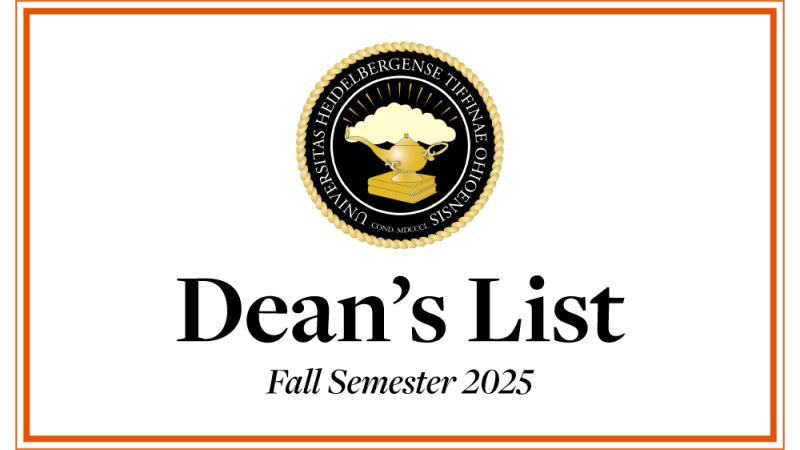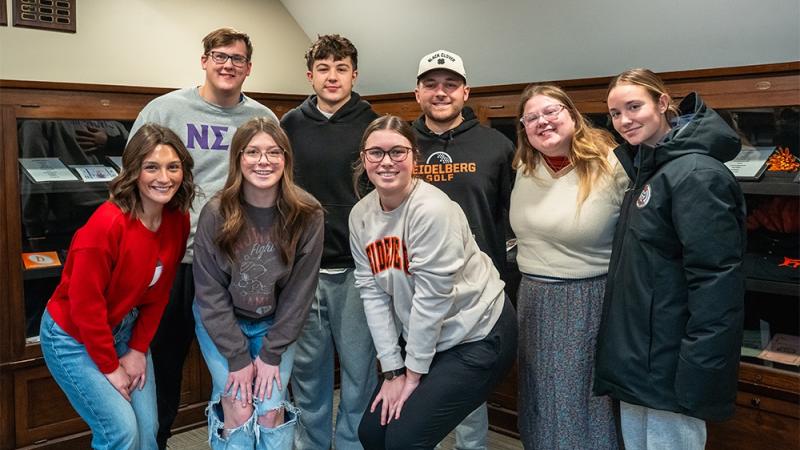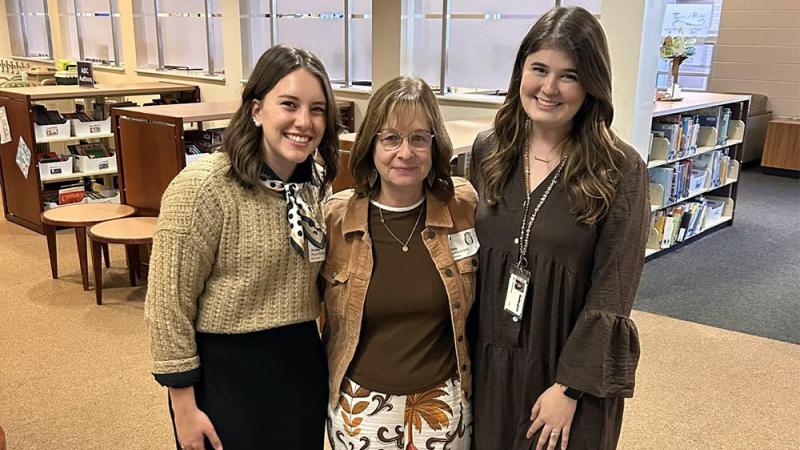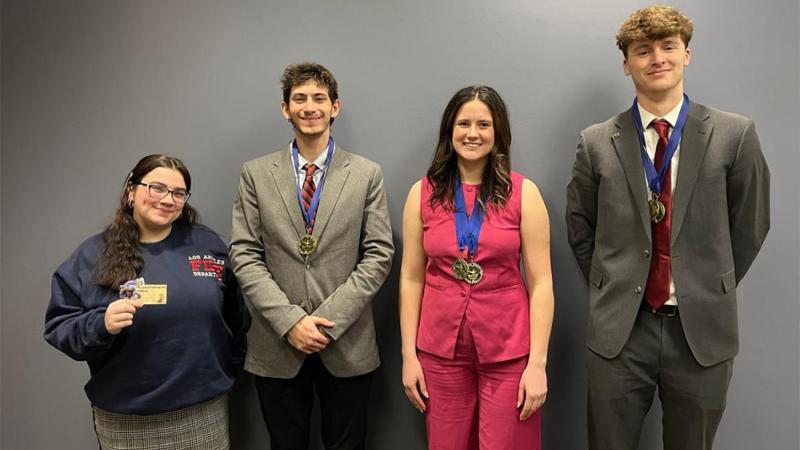It takes a composer to know a composer: Meet Dr. Matthew Kennedy
Dr. Matthew Kennedy is one busy composer. And professor. And family man.
As the veritable “new guy” on the Heidelberg School of Music & Theatre faculty, Matthew has already begun to make his mark on the school and future composers.
When he joined the ‘Berg family a little over a year ago, he brought with him quite a resumé of original compositions and premieres, across a broad spectrum of composition settings. And as that aspect of his professional career seems to be ramping up, HU students – current and future – are the beneficiaries of his craft, creativity and composition aficionado. All of that is about to expand even further – to high school students.
“It’s been nice to be welcomed in but also have folks be willing to make changes,” Matthew says from his Brenneman Hall studio. “The traditions here are wonderful and we want to continue Doug (McConnell)’s legacy, while also making things grow and move forward. That’s a healthy approach, especially at a small liberal arts school.”
An auspicious beginning
Matthew’s musical roots are in pop music. For a time, he was a singer/songwriter with a goal of breaking into the music industry through that door. But something was luring him toward composition.
Like a lot of kids, Matthew joined his elementary school band. Subjected to youthful ridicule, he put away his clarinet a year later. While his first entre into the world of music didn’t go particularly well, it did lead to the next … and the next. He joined his school choir and eventually, garage bands. There was even a thought of pursuing a degree in architecture.
But composition was calling. He eventually switched to composition while an undergrad at Anderson University in Indiana and followed that with a master’s degree from Butler University and his Doctor of Musical Arts degree from The Hartt School.
His first composition was for an area church choir. “It felt very big at the time,” he recalls. “It’s always a thrill when strangers learn and perform your music.” Since then, he’s grown in his artistry and dramatically expanded his base. His first original opera was premiered in 2012.
Since finding his niche in the field, working quite often with chamber music, Matthew today has more than 50 compositions “out there” but he’s actually written a lot more. During the pandemic, his focus was on composing solo works but he’s also composed for solo, symphonies, opera and other large ensembles. The world has taken note. Matthew’s compositions have been performed to critical acclaim on five continents and 15 countries. And there’s more to come.
Finding his place
Premiering new works is a herculean effort by itself, let alone getting works written for larger ensembles performed and reperformed. Matthew knows the routine very well.
“Any time a composer gets to write for large ensemble is really a treat as it is a massive investment of resources and time by all parties involved,” he says.
On Oct. 13, he’ll get to see a year’s worth of preparation come to fruition as the University of South Florida Wind Ensemble, under the direction of Matthew McCutchen, will premiere his new violin concerto, All the Bright and Precious Things. The work is in a relatively new field: wind ensemble for strings. A second premiere, Impatient Youth, will be performed by the Heidelberg Faculty Woodwind Quintet at the 2022 Bowling Green State University New Music Festival
Additionally this fall, Matthew is collaborating with Heidelberg saxophone instructor Joshua Heaney on a concerto for alto saxophone and wind ensemble. Tentatively titled What If It All Works Out, the work will delve into the subject of performance anxiety and quieting the doubting voice within. It’ll receive its premier next spring by the Keene State College Concert Band, under the direction of John Hart.
Finding inspiration
Artists tend to process the world around them differently. Matthew’s family – his partner, Erin, and four children – are frequently a source of inspiration. “I like the sense of play,” he explains. But he also draws from nature and different environments.
Formulating ideas and turning them into writing can be a bit lonely; he much prefers the collaboration stage. That’s why he juggles a number of projects simultaneously and works a year out, sometimes even further.
Currently, he’s finishing two pieces – one for solo guitar that will be premiered in Philadelphia and another for trombone choir that will be premiered at the University of Connecticut, both later this year.
‘Let’s give Tiffin a try’
Matthew and his family have been at Heidelberg and in Tiffin for a little over a year. When they decided to make the move, they agreed that it would be important “to get ingrained in the community.” It’s been a good move all around. His commute is now short and the community is reminiscent of the small Midwest town where he grew up.
His hometown had minimal arts infrastructure, so Matthew is happy to be in a place that embraces the arts. “It’s been nice. With communities on the mend (from COVID), a lot of events such as arts and music festivals are coming back.”
That’s the case with a first-time event that Matthew is organizing and launching later this year. He and his SMT colleagues are offering the first annual Heidelberg University Honor Band and Choir Call for Scores to showcase works by composers currently attending high school in Ohio, Indiana, Michigan and Pennsylvania.
Calling all high school composers
The goal, Matthew explains, is to get future composers and possibly future Heidelberg students on campus, where they can experience what life as a college student is like. It’ll also be a chance for the high schoolers to collaborate with Heidelberg ensemble directors Greg Ramsdell (Concert Choir) and Rod Miller (Marching Band), alongside Matthew.
The students will be invited to come to Heidelberg to participate in the University Honor Band and Choir Festival in January. Ultimately, the selected works will receive workshop sessions with the directors and their compositions will receive performances at the festival.
The message to the high school students is simple: “Heidelberg is building a growing program and it should be on your mind if you’re looking at composing.”
“We welcome the creative spirit here at Heidelberg,” Matthew says.
Here are more details about the Call for Scores.
Composition Studio = opportunities
“We believe students are at their best when allowed to be creators and innovators,” Matthew says.
To that end, he launched Heidelberg’s Composition Studio, a place where students receive training in composing concert music, songwriting, arranging/orchestration and electroacoustic music.
The studio is full of opportunities for students to work toward successful careers as composers.
Within the studio setting, students receive one-on-one lessons, courses in acoustic and electronic composition, weekly seminars and regular masterclasses with guest artists and ensembles.
Each semester, composers have the opportunity to collaborate with student and professional performers to premiere works on Composition Studio recitals, along with regular opportunities to have works read, workshopped and performed by our ensembles.
This fall, the studio is beginning a partnership with the Ritz Theatre for the Performing Arts. The collaboration will allow our student composers to write incidental music for all of their theatrical productions.
“In addition to composing works for solo, chamber, large-ensemble and electronic/electroacoustic music, our composition students carry out a series of career-building projects focused on the music business, portfolio preparation, listening assignments and reading assignments – all geared toward career prep,” Matthew says.




